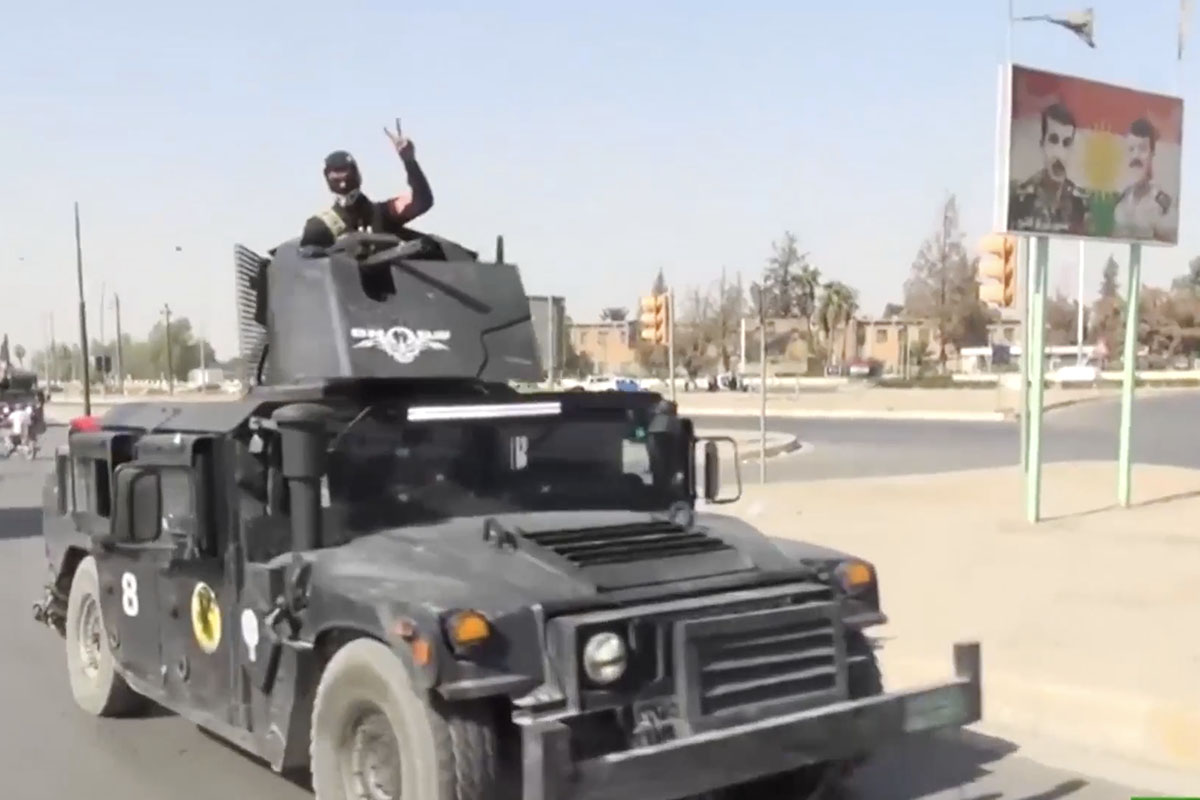Kurds claim oppression in Kirkuk region two months after Iraqi takeover
Fears that heavy-handed tactics might fuel new Sunni insurgency as UN investigates claims Kurdish homes were burned.
A video posted online shows Kurdish students in the northern Iraq city of Kirkuk holding a Kurdish flag. They raised the flag to mark “Kurdish Flag Day,” an annual event that includes celebrations in the Kurdistan region of Iraq. This flag day was marred, however, by reports of arrests of Kurdish students in Kirkuk and gun battles overnight in city that continues to be a center of tension between Kurds who live there and the Iraqi central government.
In mid-October, following the Kurdistan Regional Government’s independence referendum, the Iraqi central government took over Kirkuk in a display of force, sending tanks and armored columns to wrest the city from Kurdish control. After three years of war on Islamic State, the central government was attempting to reassert its power and reduce Kurdish control of the disputed city that had been defended by Kurdish Peshmerga since 2014. Kurdish activists say that since October, Kurdish stores, homes, cultural and political centers have been targeted in Kirkuk and the nearby city of Tuz Khurmatu. More than 100,000 Kurds fled the city and its neighboring areas in October, and many have not returned home.
Kirkuk and the region around are an ethnically diverse part of Iraq. The area has been claimed by the Kurdish autonomous region and has been a center of contention between Kurds and Baghdad for many decades. Some Kurds call it the “Jerusalem” of Kurdistan. However, many Turkmen and Arabs in the city wish it would be governed by Iraqi security forces. Some support the pro-Iranian Shi’a militias, often called Hashd al-Shaabi or Popular Mobilization Forces (PMF).
On the night of December 16, locals in Kirkuk reported gunfire. A Turkmen political office was targeted. On Sunday morning, several Kurdish students at the University of Kirkuk were detained by the PMF, locals claimed. The Shi’ite militias were supported to withdraw from Kirkuk in late October, and their continued presence has resulted in extrajudicial detentions of locals, especially Kurds, say activists. Hemin Hawrami, a senior assistant to former Kurdistan region president Masoud Barzani, tweeted, “Atrocities, oppressions, blockade and collective punishment by Iran-backed Shi’ite militias in Kirkuk failed to break the will and firm determination of our people.”
This reminds residents of the lack of security in the city that existed in the years leading up to rise of ISIS. Terrorist groups in and around Kirkuk often targeted the city before 2014. The divisions within the city enabled terrorist cells to grow. Now, Kurdish resentment at heavy-handed Iraqi tactics risks another round of protests and violence. The Iraqi government and its allied militias removed Kurdish flags when they rolled into the city in October. They replaced them with Iraqi flags and Turkmen nationalist flags. At schools, monuments and other places, the symbolic change angers Kurdish locals. Under Kurdish governance, the Provincial Council in Kurdistan voted in March 2017 to raise the Kurdish flag alongside the Iraqi one. In August, the local Turkmen Front appealed to an Iraqi court, which ruled that the Kurdish flag should be taken down. Two months later, the Iraqis carried out the court decision by force. The Kurdish governor, Najmaldin Karim, was expelled from his office and Kurdish officials fled the city.
Since October, the Iraqi government has sought to increase its control of the economy in the city, signing a new oil deal on December 9 to export 60,000 barrels of oil per day to Iran, in exchange for Iran sending a similar amount to Iraqi’s southern ports. Baghdad wants to redirect Kirkuk’s oil to Iran and elsewhere after years in which the KRG exported that oil via Turkey.
On December 15, the UN high commissioner for human rights issued a report expressing “serious concern” about violence in the city of Tuz Khurmatu, southeast of Kirkuk. The city had been occupied by Iraqi forces in October. “In recent weeks, clashes have broken out between Kurdish Security Forces, also known as the Peshmerga, and Turkmen Popular Mobilization Units. This fighting has to date resulted in an unconfirmed number of deaths in each group.” A UN team visited the area for a week in early December, and noted that 150 buildings had been burned. The UN noted in October that many Kurdish families had fled the city and not returned, and that Kurds reported their houses had been looted.
Since early December, there have also been clashes near Tuz Khurmatu in the mountains to the east of the city. According to Kurdish media network NRT, the Iraqi Army sought to attack a group of “Sunni fighters” on Ghara Mountain. In addition, mortars and rockets were fired at Tuz from the mountains, and Iraqi warplanes bombed the area in response. Rudaw, a Kurdish media network, has also reported that an armed group of Kurds had formed a “liberation army” in the mountains to resist Iraqi control. There were also rumors that other armed men, comprised of Kurds and Arabs, were operating in rural areas near Tuz. The picture painted in various reports is that the swift advance of the Iraqi Army and Shi’ite militias will be contested by disaffected groups, including Kurds and Sunni Arabs. This could represent a return to the years before 2014, when jihadist groups such as Ansar al-Sunnah and Ansar al-Islam operated in the area, fueled by Sunni grievances against what they saw as a pro-Iranian regime in Baghdad. A new insurgency could be fueled by these grievances as well as by former ISIS fighters who survived and fled into the Hamrin Mountains and other rural areas, awaiting their chance to return.
Source: The Jerusalem Post | Seth J. Frantzman

